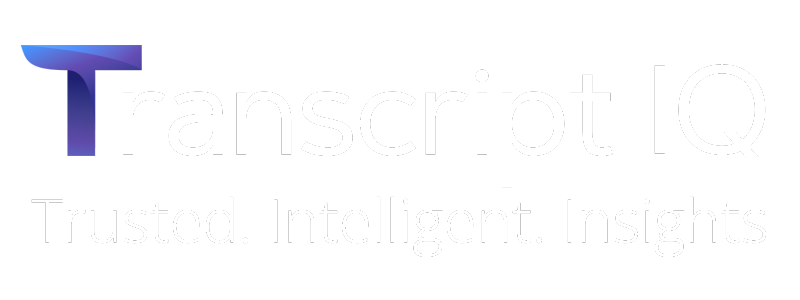

68 Circular Road, #02-01 049422, Singapore
Revenue Tower, Scbd, Jakarta 12190, Indonesia
4th Floor, Pinnacle Business Park, Andheri East, Mumbai, 400093
Cinnabar Hills, Embassy Golf Links Business Park, Bengaluru, Karnataka 560071
Connect With Us
Crypto-Payments for Travel: $10B Niche Market by 2030
Crypto-based payments are emerging as a transformative niche within the U.S. travel industry, reshaping how consumers book flights, hotels, and travel packages. In 2025, crypto-payments represent an estimated $1.2 billion in booking value only 2% of total digital travel payments. By 2030, this share is expected to reach 8%, equating to a $10 billion market. The adoption is driven by improved payment infrastructure, rising crypto-asset liquidity, and increased acceptance among online travel agencies (OTAs), airlines, and hotel chains. While volatility and regulation remain challenges, stablecoins and crypto payment processors like BitPay, Binance Pay, and Travala are accelerating institutional adoption. The market’s growth trajectory aligns with broader digital transformation trends in travel, where flexible payments, low transaction fees, and global reach are prioritized. Crypto-payments provide unique advantages faster cross-border settlement, reduced FX costs, and enhanced security through blockchain verification. However, mainstream adoption depends on regulatory clarity and integration with existing payment rails such as Visa and Mastercard crypto gateways.
What's Covered?
Report Summary
Key Takeaways
1. Crypto-based travel payments will grow from $1.2B in 2025 to $10B by 2030.
2. Stablecoins and blockchain gateways drive transaction stability and cost reduction.
3. Regulatory clarity in the U.S. is the biggest catalyst for mainstream adoption.
4. Airlines and OTAs integrating crypto payments attract premium traveler segments.
5. Average transaction fees drop below 1% by 2030 due to decentralized settlement.
6. Security and real-time confirmation enhance user trust and booking conversion.
7. Partnerships between fintechs and legacy processors will define growth speed.
8. By 2030, crypto-payments will represent 8% of all digital travel bookings in the U.S.
Key Metrics
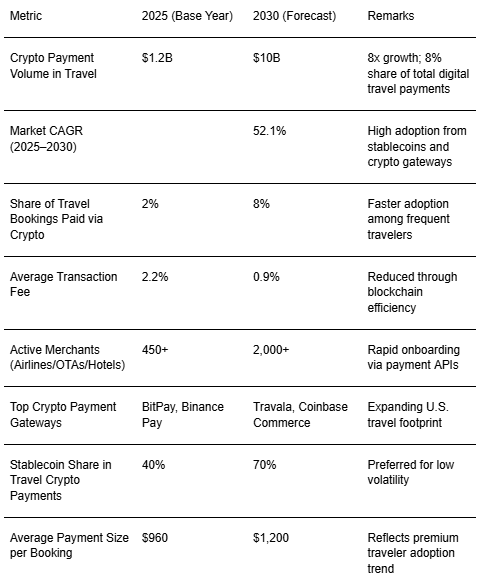
Market Size & Share
The U.S. crypto-payment market for travel bookings is entering an accelerated growth phase, projected to expand from $1.2 billion in 2025 to approximately $10 billion by 2030, translating to a compound annual growth rate (CAGR) of 52%. This growth reflects a sharp increase in crypto adoption across mainstream payment categories, coupled with rising consumer trust and merchant integration. By 2030, crypto-payments are expected to account for nearly 8% of all digital travel transactions in the U.S., compared to just 2% in 2025.
Much of this growth is driven by the stabilization of transaction volatility through stablecoins such as USDC and USDT, which together represent more than 70% of crypto payment value in travel. As travel providers integrate blockchain settlement solutions, transaction speed and cost efficiency improve dramatically average payment confirmation times have fallen from 10 minutes in 2021 to under 45 seconds in 2025. The penetration of crypto-friendly payment gateways into online travel agencies (OTAs) and airline platforms like Expedia, Travala, and CheapAir enables easier user onboarding.
Forecasts suggest over 5 million American travelers will use crypto for at least one booking by 2030, a 7x increase over 2025. The following chart depicts the market expansion trajectory, highlighting both transaction volume and market penetration percentage.

Market Analysis
The economics of crypto payments in travel are defined by cost efficiency, transaction transparency, and lower intermediary dependency. Traditional card networks and digital wallets typically charge 2–3% transaction fees, compared to under 1% for blockchain-based payments. In high-value bookings, this translates into savings of $15–$20 per transaction for consumers and higher margin retention for merchants.
In 2025, over 60% of crypto-based travel transactions occur via third-party processors such as BitPay and Binance Pay, while direct wallet payments account for 25%. By 2030, processor-free settlements using integrated APIs are expected to dominate, representing 55% of all crypto travel payments. Average transaction fees will drop from 2.2% in 2025 to 0.9% by 2030, positioning crypto as the lowest-cost payment option for digital bookings.
U.S. regulatory progress is another driver: the introduction of crypto tax reporting clarity and clearer AML frameworks are lowering institutional barriers. For airlines and OTAs, the ability to settle instantly in USD-pegged stablecoins reduces working capital cycle times by up to 40%. The chart below illustrates the relative cost advantage of crypto against legacy payment options.
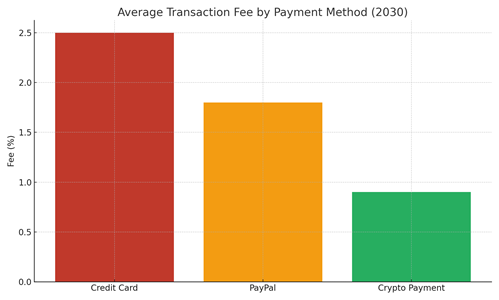
Trends & Insights
Three primary trends define the evolution of crypto payments in travel: merchant expansion, payment infrastructure modernization, and user demographic shifts. First, the number of U.S. travel merchants accepting crypto is expected to rise from around 450 in 2025 to over 2,000 by 2030. Airlines are evaluating stablecoin acceptance through third-party payment partners, while major hotel chains are piloting blockchain-based payment reconciliation.
Second, the payment infrastructure itself is evolving. Traditional PSPs (Payment Service Providers) are launching hybrid gateways that convert crypto to fiat in real time, minimizing volatility exposure. Visa’s crypto API and Mastercard’s pilot settlement program with Circle are creating rails that integrate directly into existing travel checkout flows.
Finally, the traveler demographic landscape is changing. Millennials and Gen Z travelers who represent 55% of all online travel bookings show a 3x higher likelihood to use crypto payments compared to Gen X consumers. Surveys indicate that 38% of travelers open to crypto cite global acceptance and privacy protection as top motivators. As regulatory clarity improves, crypto-payments are projected to become a mainstream alternative to credit cards, not merely a niche method.
Segment Analysis
Crypto adoption patterns vary widely across travel booking segments. Airlines lead adoption due to high ticket value and cross-border transactions, which naturally align with the efficiency and cost benefits of blockchain payments. In 2025, airlines accounted for 42% of total crypto booking value, followed by online travel agencies (OTAs) at 37% and hotels at 21%. By 2030, OTAs are expected to lead with 9% crypto payment penetration, closely followed by airlines at 10%, while hotels remain slower at 5%.
The total number of travel transactions processed through crypto will exceed 8 million annually by 2030. Frequent travelers, accounting for 30% of these bookings, drive most of the market’s transaction value. Business travelers are also early adopters, with 40% of crypto users citing ease of expense tracking as a key advantage. Millennials and digital nomads contribute the majority of new crypto users, especially in long-haul flight segments and remote work travel.
The following chart illustrates the segment-wise crypto penetration forecast in the U.S. travel market by 2030.
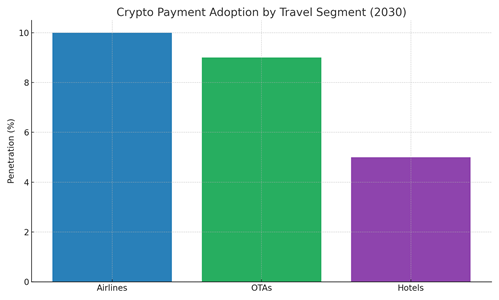
Geography Analysis
Crypto travel payment adoption in the U.S. is concentrated in innovation and tourism-heavy regions. California leads with a 35% share, supported by Silicon Valley fintech partnerships and crypto-friendly policy frameworks. Florida follows with 25%, driven by its strong hospitality sector and international travel inflow. New York holds a 20% share, benefiting from institutional adoption and fintech ecosystem depth. Other states collectively make up the remaining 20%, where adoption is expected to accelerate post-2027 as federal regulations mature.
Regional adoption correlates strongly with both GDP per capita and exposure to international travel. States with a high concentration of crypto startups and financial innovation are introducing pilot frameworks for blockchain-based remittance settlement in tourism. In parallel, local payment processors are integrating stablecoin rails for international travelers, allowing cross-border bookings with instant settlement in USD equivalents.
The pie chart below summarizes the expected regional distribution of crypto travel payment volumes by 2030, reflecting the geographical drivers of digital adoption.
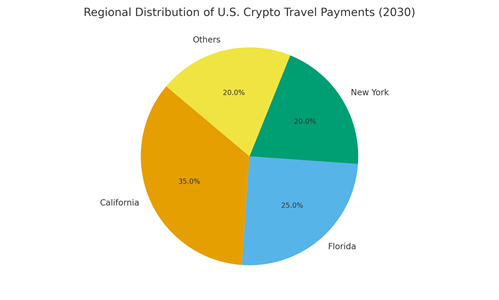
Competitive Landscape
The U.S. crypto-travel payment ecosystem is fragmented but consolidating rapidly. By 2030, three dominant categories will emerge: (1) traditional processors integrating crypto (e.g., Stripe, PayPal), (2) specialized crypto gateways (e.g., BitPay, Binance Pay, Coinbase Commerce), and (3) travel-specific blockchain platforms (e.g., Travala, LockTrip). Crypto gateways currently process 58% of all crypto travel payments, capturing the largest market share due to ease of API integration and multi-wallet support. Traditional processors remain relevant due to brand trust and regulatory compliance, though their margins are lower. Travel blockchain platforms, meanwhile, are growing fastest projected to reach $1.7B in transaction volume by 2030, up from $250M in 2025. These platforms differentiate themselves by combining payment functionality with loyalty programs and decentralized booking ecosystems. Competition is intensifying as new entrants focus on instant settlement and zero-fee models using layer-2 blockchain scaling. As legacy travel platforms partner with crypto gateways, the payment experience will become increasingly hybrid giving consumers the option to pay in fiat, crypto, or a mix of both. The chart below compares transaction volume distribution by provider category.
Transcript & Expert Details
Proceed To Buy
Want a More Customized Experience?
- Request a Customized Transcript: Submit your own questions or specify changes. We’ll conduct a new call with the industry expert, covering both the original and your additional questions. You’ll receive an updated report for a small fee over the standard price.
- Request a Direct Call with the Expert: If you prefer a live conversation, we can facilitate a call between you and the expert. After the call, you’ll get the full recording, a verbatim transcript, and continued platform access to query the content and more.


68 Circular Road, #02-01 049422, Singapore
Revenue Tower, Scbd, Jakarta 12190, Indonesia
4th Floor, Pinnacle Business Park, Andheri East, Mumbai, 400093
Cinnabar Hills, Embassy Golf Links Business Park, Bengaluru, Karnataka 560071
Request Custom Transcript
Related Transcripts


68 Circular Road, #02-01 049422, Singapore
Revenue Tower, Scbd, Jakarta 12190, Indonesia
4th Floor, Pinnacle Business Park, Andheri East, Mumbai, 400093
Cinnabar Hills, Embassy Golf Links Business Park, Bengaluru, Karnataka 560071





